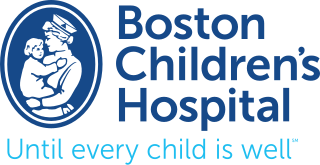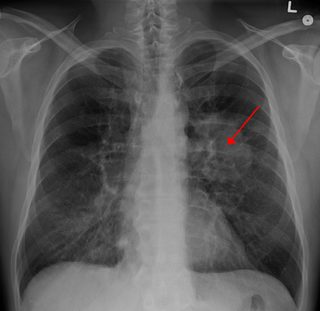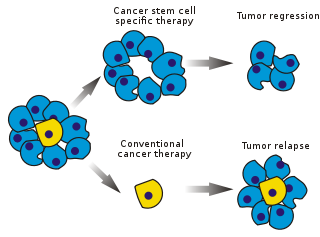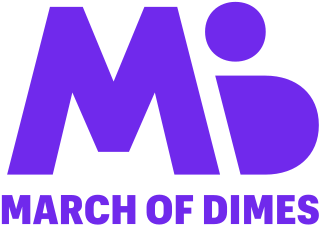
Homeobox protein NANOG is a transcriptional factor that helps embryonic stem cells (ESCs) maintain pluripotency by suppressing cell determination factors. Therefore NANOG deletion will trigger differentiation of ESCs. There are many different types of cancer that are associated with NANOG. In humans, this protein is encoded by the NANOG gene.

Kim Ashley Nasmyth is an English geneticist, the Whitley Professor of Biochemistry at the University of Oxford, a Fellow of Trinity College, Oxford, former scientific director of the Research Institute of Molecular Pathology (IMP), and former head of the Department of Biochemistry, University of Oxford. He is best known for his work on the segregation of chromosomes during cell division.
The Cancer Genome Atlas (TCGA) is a project, begun in 2005, to catalogue genetic mutations responsible for cancer, using genome sequencing and bioinformatics. TCGA applies high-throughput genome analysis techniques to improve our ability to diagnose, treat, and prevent cancer through a better understanding of the genetic basis of this disease.

SRY -box 2, also known as SOX2, is a transcription factor that is essential for maintaining self-renewal, or pluripotency, of undifferentiated embryonic stem cells. Sox2 has a critical role in maintenance of embryonic and neural stem cells.
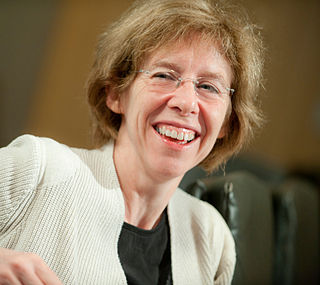
Fiona Watt, is a British scientist who is internationally known for detailing the mechanisms that control epidermal stem cell renewal, differentiation, and tissue aggregation. She is also known for discovering how each of those processes' regulations are removed in diseased cells. She is director of the Centre for Stem Cells & Regenerative Medicine at Kings College London, and executive chair of the MRC.

Janet Rossant, is a developmental biologist well known for her contributions to the understanding of the role of genes in embryo development. She is a world renown leader in developmental biology. Her current research interests focus on stem cells, molecular genetics, and developmental biology. Specifically, she uses cellular and genetic manipulation techniques to study how genetics control both normal and abnormal development of early mouse embryos. Rossant has discovered information on embryo development, how multiple types of stem cells are established, and the methods at which genes control development. In 1998, her work helped lead to the discovery of the trophoblast stem cell, which has assisted in showing how congenital anomalies in the heart, blood vessels, and placenta can occur.
In cell biology, a precursor cell, also called a blast cell or simply blast, is a partially differentiated cell, usually referred to as a unipotent cell that has lost most of its stem cell properties. A precursor cell is also known as a progenitor cell but progenitor cells are multipotent. Precursor cells are known as the intermediate cell before they become differentiated after being a stem cell.
Elizabeth (Liz) Jane Robertson FRS is a British developmental biologist based at the Sir William Dunn School of Pathology, University of Oxford. She is Professor of Developmental Biology at Oxford and a Wellcome Trust Principal Research Fellow. She is best known for her pioneering work in developmental genetics, showing that genetic mutations could be introduced into the mouse germ line by using genetically altered embryonic stem cells. This discovery opened up a major field of experimentation for biologists and clinicians.
Joanne Chory is an American plant biologist and geneticist. Chory is a professor and director of the Plant Molecular and Cellular Biology Laboratory, at the Salk Institute for Biological Studies and an investigator of the Howard Hughes Medical Institute. She holds the Howard H. and Maryam R. Newman Chair in Plant Biology. She is also an adjunct professor in the Section of Cell and Developmental Biology, UC San Diego.
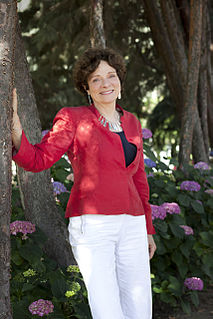
Helen Margaret Blau, Ph.D. is an internationally recognized American biologist and the Donald E. and Delia B. Baxter Foundation Professor and Director of the Baxter Laboratory for Stem Cell Biology at Stanford University School of Medicine. She is known for establishing the reversibility of the mammalian differentiated state. Her landmark papers showed that nuclear reprogramming and the activation of novel programs of gene expression were possible, overturning the prevailing view that the differentiated state was fixed and irreversible. Her discoveries opened the door for cellular reprogramming and its application to stem cell biology.
Vincent Cryns is the Chief of the Division of Endocrinology, Diabetes & Metabolism at the University of Wisconsin School of Medicine and Public Health and holds the Marian A. and Rodney P. Burgenske Chair in Diabetes Research.

Elaine Ann Ostrander is an American geneticist at the National Human Genome Research Institute (NHGRI) of the National Institutes of Health (NIH) in Bethesda, Maryland She holds a number of professional academic appointments, currently serving as Distinguished and Senior Investigator and head of the NHGRI Section of Comparative Genomics; and Chief of the Cancer Genetics and Comparative Genomics Branch. She is known for her research on prostate cancer susceptibility in humans and for conducting genetic investigations with the Canis familiaris, the domestic dog model, which she has used to study disease susceptibility and frequency and other aspects of natural variation across mammals. In 2007, her laboratory showed that much of the variation in body size of domestic dogs is due to sequence changes in a single gene encoding a growth-promoting protein.
Thorsten M. Schlaeger, Ph.D., is the head of the Human Embryonic Stem Cell Core Facility of the Stem Cell Program at Boston Children’s Hospital.

Nevan J. Krogan, a Canadian molecular biologist, is a professor in the Department of Cellular and Molecular Pharmacology at the University of California San Francisco (UCSF), and a senior investigator at the J. David Gladstone Institutes. He is also the Director of the Quantitative Biosciences Institute, (QBI), which focuses on developing and using quantitative approaches to study basic biological mechanisms, often related to disease areas. He serves as Director of The HARC Center, an NIH-funded collaborative group that focuses on the structural characterization of HIV-human protein complexes. Krogan's research is focused on using quantitative system approaches to help understand complex biological and biomedical problems. He has authored over 200 papers in the field of molecular biology and has given over 200 lectures and seminars around the world.
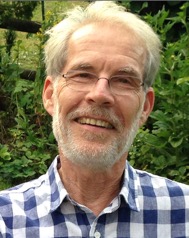
Thomas Graf is a biologist at the Centre for Genomic Regulation (CRG) in Barcelona, Spain. He is a pioneer in cell reprogramming, showing that blood cells can be transdifferentiated by transcription factors. He is also known for his early work on oncogenes carried by retroviruses and oncogene cooperation in leukemia formation.

Bradley E. Bernstein is a biologist and Professor of Pathology at the Massachusetts General Hospital and the Broad Institute of MIT and Harvard. He is the Director of the Broad Institute Epigenomics Program. He is also a professor at Harvard Medical School. He is known for contributions to the fields of epigenetics and cancer biology.

Amit Dutt is an Indian scientist, geneticist and the principal investigator at Advanced Centre for Treatment, Research and Education in Cancer (ACTREC) of Tata Memorial Centre. Known for his studies on Fibroblast growth factor receptor, Dutt is a Wellcome Trust / DBT India Alliance Intermediate Fellow. The Council of Scientific and Industrial Research, the apex agency of the Government of India for scientific research, awarded him the Shanti Swarup Bhatnagar Prize for Science and Technology, one of the highest Indian science awards, for his contributions to medical sciences in 2017.

Yi Zhang is a Chinese-American biochemist who specializes in the fields of epigenetics, chromatin, and developmental reprogramming. He is a Fred Rosen Professor of Pediatrics and Professor of Genetics at Harvard Medical School, a Senior Investigator of Program in Cellular and Molecular Medicine at Boston Children's Hospital, and an Investigator of the Howard Hughes Medical Institute. He is also an Associate Member of the Harvard Stem Cell Institute, as well as the Broad Institute of MIT and Harvard. He is best known for his discovery of several classes of epigenetic enzymes and the identification of epigenetic barriers of SCNT cloning.

Carole LaBonne is a Developmental and Stem Cell Biologist at Northwestern University. She is the Erastus O. Haven Professor of Life Sciences, and Chair of the Department of Molecular Biosciences.
Rachel Dutton is an American microbiologist. She is known for her work using cheese as a model system for complex interacting microbial communities. She has worked with chefs including Dan Felder, head of Research and Development at Momofuku to develop new fermentation procedures to be used in food. She is an Assistant Professor in the Division of Biological Sciences at the University of California, San Diego.

